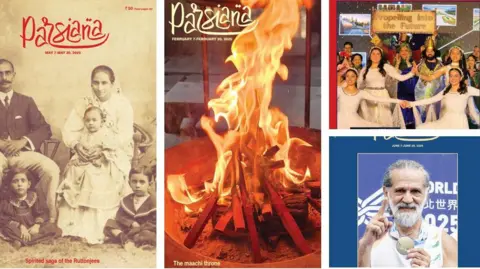In the Damascus suburb of Ashrafiyat Sahnaya, local resident Lama al-Hassanieh’s life was turned upside down as gunfire broke out near her home. With fighters chanting threats against the Druze community on the streets below, she took refuge in her bathroom, fearing for her life. The Druze people, who follow a unique faith derived from Shia Islam, have historically tried to navigate Syria's complex political landscape. Many had backed the government of Bashar al-Assad, believing that their loyalty would shield them during the country’s ongoing civil war.
However, following the ascent of Sunni Islamist-led factions after Assad's government was destabilized, the Druze community now confronts a grim reality: a perceived lack of safety. Violent attacks on Druze individuals and families, particularly after inflammatory incidents, have ignited deep-rooted fears of sectarian targeting. A widely circulated audio recording, allegedly featuring a Druze leader insulting Islam’s Prophet Muhammad—even though disproven—sparked violent reprisals against the community, resulting in over 130 deaths, including military personnel and civilians.
Lama Zahereddine, a pharmacy student, experienced this chaos firsthand as violence erupted in her village, forcing her and others to flee as armed groups attacked with heavy weapons. As tensions escalated, even campuses became battlegrounds for aggression against Druze students—embodying the pervasive atmosphere of distrust and insecurity that many in the community feel.
Druze individuals are increasingly alarmed over their futures, with some feeling let down by the government that they once trusted. "The government claims these attacks are from unaffiliated groups, but who will be held accountable?" questioned Lama al-Hassanieh, summing up the community's frustrations. Fellow Druze, like Hadi Abou Hassoun, have even taken matters into their own hands, forming volunteer groups to protect their neighborhoods against the escalating violence, but these efforts often end in peril.
Despite brief lulls in violence, the pervasive atmosphere remains one of caution and skepticism, with many feeling that sectarian divisions are only worsening. As the emotional and physical scars deepen, members of the Druze community in Syria echo a call for rights, recognition, and a return to a more secure existence within a nation they identify with at their core.
However, following the ascent of Sunni Islamist-led factions after Assad's government was destabilized, the Druze community now confronts a grim reality: a perceived lack of safety. Violent attacks on Druze individuals and families, particularly after inflammatory incidents, have ignited deep-rooted fears of sectarian targeting. A widely circulated audio recording, allegedly featuring a Druze leader insulting Islam’s Prophet Muhammad—even though disproven—sparked violent reprisals against the community, resulting in over 130 deaths, including military personnel and civilians.
Lama Zahereddine, a pharmacy student, experienced this chaos firsthand as violence erupted in her village, forcing her and others to flee as armed groups attacked with heavy weapons. As tensions escalated, even campuses became battlegrounds for aggression against Druze students—embodying the pervasive atmosphere of distrust and insecurity that many in the community feel.
Druze individuals are increasingly alarmed over their futures, with some feeling let down by the government that they once trusted. "The government claims these attacks are from unaffiliated groups, but who will be held accountable?" questioned Lama al-Hassanieh, summing up the community's frustrations. Fellow Druze, like Hadi Abou Hassoun, have even taken matters into their own hands, forming volunteer groups to protect their neighborhoods against the escalating violence, but these efforts often end in peril.
Despite brief lulls in violence, the pervasive atmosphere remains one of caution and skepticism, with many feeling that sectarian divisions are only worsening. As the emotional and physical scars deepen, members of the Druze community in Syria echo a call for rights, recognition, and a return to a more secure existence within a nation they identify with at their core.

















